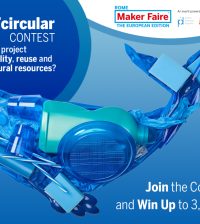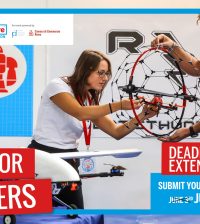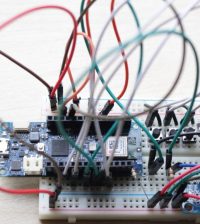- makeITcircular 2024 content launched – Part of Maker Faire Rome 2024Posted 2 weeks ago
- Application For Maker Faire Rome 2024: Deadline June 20thPosted 2 months ago
- Building a 3D Digital Clock with ArduinoPosted 7 months ago
- Creating a controller for Minecraft with realistic body movements using ArduinoPosted 7 months ago
- Snowflake with ArduinoPosted 8 months ago
- Holographic Christmas TreePosted 8 months ago
- Segstick: Build Your Own Self-Balancing Vehicle in Just 2 Days with ArduinoPosted 8 months ago
- ZSWatch: An Open-Source Smartwatch Project Based on the Zephyr Operating SystemPosted 9 months ago
- What is IoT and which devices to usePosted 9 months ago
- Maker Faire Rome Unveils Thrilling “Padel Smash Future” Pavilion for Sports EnthusiastsPosted 10 months ago
The emergency calls, makers and innovators respond
The Coronavirus emergency is a real war on an invisible enemy and it is being fought on several battlefronts, first of all in the “trenches”, the hospital wards. The scarcity of DIPs (personal protective equipment), protection systems and valves for automatic respirators only cause doctors difficulties. The state intervened with huge measures but the citizens preferred not to stand by and started crowdfounding campaigns for the purchase of materials. But, above all, teams of experts and makers have decided to collaborate and put their knowledge together to create new devices and modify existing ones. Below is a note issued by the Maker Faire Rome Press Office.
Rome, 04 April 2020 – It is the people and projects we read about every day that surprise us with ingenuity, audacity and effectiveness. They are the protagonists of Maker Faire Rome – The European Edition who are mobilizing each one in their own territories and through Maker Faire Rome, to make their own contribution. A fight against time and in full spirit makers: supportive and open source.
Today we want to report OpenDot , a Milanese FabLab that has always been dedicated to healthcare, at the forefront of the emergency.
OpenDot, since its foundation in 2015, has started working, researching and experimenting in the healthcare sector.
Specifically, it deals with design and innovation in the health sector through the creation of:
- customized aids
- software development
- training with doctors and therapists
Today the health emergency that is affecting the world and the rapid response of the maker community shows that everyone’s contribution is necessary to tackle complex problems, also to co-design and validate the solutions by collaborating mainly with the doctors themselves.
Because every hospital has its own instruments and therapies and there are no universal solutions, but specific ones for every need.
PARTICIPATORY DESIGN
To achieve this, the world of fablabs and makers applies what is called co-design in jargon , or participatory design that involves people with different skills around the same table. In the case of the Coronavirus emergence: makers, therapists, designers, care-givers and care-receivers.
OpenDot embraces the philosophy of sharing and open source through the Careables.org platform , created in collaboration with seven other European partners including:
- university departments
- design studies
- foundations
it is collecting solutions and aids , but also useful informations to deal with the spread of Covid-19 .
EXPERIENCE IN THE HEALTHCARE SECTOR
OpenDot, by enhancing an ad hoc section of its online platform, will help document projects from all the makers community and provide support to those who want to replicate or implement them.
Given his strong experience in the health sector, he will help makers and fablabs – as well as users – raising awareness on the responsible use of DIY products.
OpenDot is also supporting various hospitals in the area: at Desio Hospital it provides face- shields for intensive care. Instead to Melegnano Hospital (Milan South) a revised version of Charlotte valve Decathlon mask.
THE CONTRIBUTION OF OPENDOT
Thanks to the team of designers and engineers Isinnova, who released the open source project, it was possible to optimize the design to reduce printing times and to practice “hacking” to speed up series production.
Thus began the industrial production of the Charlotte adapter, the safest and fastest method in circulation today, but distributed production is still a valid alternative for testing the system in hospitals, modifying the pieces to adapt them to different situations and receiving quickly the first pieces for emergencies.
A significant example of the power of open source and distributed digital manufacturing is the Intubation Box : a project born in Taiwan and tested at MIT in Boston that OpenDot has redesigned for laser cutting and delivered to intensive care units for testing in Hospitals of Desio and Melegnano.
Producing and distributing locally and in a widespread way in fact (one of the concepts at the base of the Fab City) allows to reduce shipments and shorten times by avoiding waiting lists.
THE MASKS
Another critical issue these days is the scarcity of PPE for doctors and healthcare professionals .
In fact, developing more comfortable, reusable and sterilizable solutions allows the drastic reduction of the risk of remaining without masks and without forgetting the environment.
OpenDot is involved in the development of various designs for 3D printable templates in collaboration with the Varese-based company Elmec, Thinking Additive (led by Marco Cavallaro), and GV Filtri.
A first version of the mask produced is already in use at the Niguarda Hospital in Milan
Obviously, the production of objects of this kind does not want to replace the industrial and certified one but the contribution of the makers, in an emergency like the one we are experiencing, consists precisely in speeding up the processes, co-creating, modifying, producing or replicating , until reaching the most effective solution .
Enrico Bassi, coordinator of the fablab OpenDot in Milan says: “In these days a lot of creative and unexpected solutions have emerged to help those who, in the front line, find themselves facing a difficultly imaginable situation. The movement of the makers reacted with heart, brain and technology. Now we need to organize, coordinate and share. We want to help support and transform makers’ projects into truly effective solutions “.
Ph. Credits Federica Mandelli – OpenDot.
Find out more about OpenDot HERE
To learn more about the stories of makers and get to know others, just visit the Maker Faire Rome blog.

























